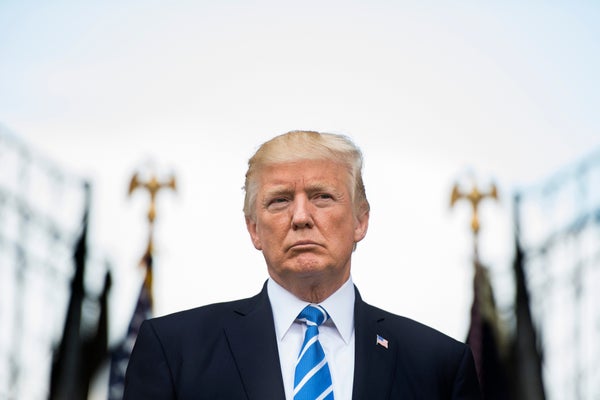The White House released a four-page memo (pdf) this week detailing its science budget priorities for fiscal year 2019, citing U.S. military superiority, security, prosperity, energy dominance and health as its top five focuses. The document makes no mention of environmental science or climate change—both top priorities under Barack Obama’s administration—but it does include commitments to basic research and aging-related health.
It should come as little surprise the Trump administration’s science priorities emphasize investment in military might to the exclusion of climate and clean energy. But some saw this memo as a relatively positive development, including Obama’s former science adviser, John Holdren. “There is much more to praise to in this document than to complain about," he says. “The fingerprints of input from the Office of Science and Technology Policy (OSTP) are evident on this document.”
The memorandum is written every year to highlight the current administration’s research and development priorities ahead of budget requests from various agencies, and this is the Trump administration’s first. Holdren also was director of the OSTP under Obama, but that position and the science adviser role both remain unfilled in the current White House. Holdren says he is encouraged to see the memo was signed by the highest-ranking OSTP official (Deputy Assistant to the President Michael Kratsios) as well as Mick Mulvaney, director of the Office of Management and Budget.
On supporting science journalism
If you're enjoying this article, consider supporting our award-winning journalism by subscribing. By purchasing a subscription you are helping to ensure the future of impactful stories about the discoveries and ideas shaping our world today.
Holdren welcomes the memo’s recognition—not evident in the administration’s previous statements—of the importance of U.S. leadership in science and technology, which the memo calls “critical to achieving this administration's highest priorities: national security, economic growth and job creation.” He praises the memo’s emphasis on military superiority as well as public health—particularly on research into aging. The document also highlights the importance of innovative early-stage research and interagency coordination, which was “a big theme for us in the Obama administration,” Holdren says. Overall, he adds, “there’s a lot to be happy about here.”
The memo has a glaring omission, however: It fails to mention the environment or climate change (either natural or human-caused). “That’s my biggest concern,” Holdren says, “although it’s not surprising, given the stances this administration has taken.” Climate change is a threat to our economy, our public health and our national security, he says, adding that “it’s a shame the Trump administration refuses to acknowledge the existence, never mind the importance, of climate change” to these other priorities.
Also missing from the memo is any reference to space exploration, although Holdren finds that less troubling, given that this area is mostly managed by NASA. “I’m more worried about the total omission of [any mention of] the environment, and the lack of understanding that the environment is in fact a pillar of our well-being,” he says. Investments in climate change adaptation and resilience would make sense even if climate were not changing, he notes.
The memo emphasizes that the government should fund basic and early-stage applied research, and should leave later-stage R&D to industry. This is a substantial departure from the president’s own FY 2018 budget request, notes Matthew Hourihan, director of the R&D Budget and Policy Program at the American Association for the Advancement of Science. For example, that request zeroed out funding for the Department of Energy’s Advanced Research Projects Agency–Energy, an agency designed to do exactly that kind of early-stage applied research. The Senate has rejected that part of the president’s request, however.
It remains to be seen what will happen to these priorities when Congress passes a budget. Will they see an increase in investment, or just smaller reductions? “To me that’s the big open question,” Hourihan says.
The latest memo on science priorities comes somewhat late in the game, given that budget requests for federal science agencies are due to the White House in early fall. Nevertheless, Holdren says the list of priorities set forth here are unlikely to be that surprising to agencies—and in fact, he says, “it’s better than I feared.”
